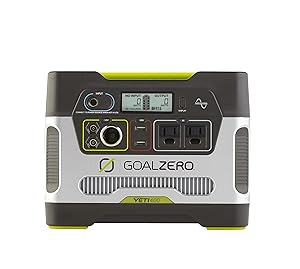
A GOAL ZERO YETI 400 is a system that captures energy from sunlight using photovoltaic (PV) cells mounted on panels. The harvested energy is then converted into electricity in the form of direct current (DC), and then inverted into alternating current (AC) before being deposited into a battery bank.
Depending on the number of panels and batteries used, a solar powered generator can power anything from small appliances and laptops to entire households. However, most small-to-moderate models only produce enough power to charge devices like laptops, smartphones, tablets, and televisions. In this guide, you’ll learn how to choose a solar generator after being introduced to some of the most popular systems in all shapes and sizes.
Why Should You Get a Solar Generator?
The most obvious advantage solar generators have over fuel-powered generators is that they’re the “green” eco-friendly GOAL ZERO YETI 400. The ability to harvest power without fuel is not only better for the environment, it also equates to no ongoing costs associated with purchasing gasoline, propane or any other fuel source.
This not only saves the owner money on electricity bills in the long-term, it also provides a reliable and independent method of power generation that relies merely on sunlight and the proper functioning of its parts.
This not only saves the owner money on electricity bills in the long-term, it also provides a reliable and independent method of power generation that relies merely on sunlight and the proper functioning of its parts.
In addition to cost-effectiveness, reliability, and eco-friendliness, here’s a more comprehensive list of 10 reasons why most people find GOAL ZERO YETI 400 advantageous to have a solar generator:
1. Generates cheaper energy – If you calculate the cost of electricity per watt over a 5-year period, even with maintenance accounted for, solar generators are always exponentially cheaper than fuel-powered generators.
2. Decreases utility bill and grid reliance – Even if your panels only produce enough output to cover 25% of your home’s electricity needs, that would still be a sizable chunk of the energy bill each month.
3. Smaller solar generators are perfect for camping – There is a wide range of portable models being especially useful for camping.
4. Neutral carbon footprint – Solar generators won’t produce any greenhouse gases or byproducts that are harmful to the environment.
5. Suitable for summer use – Solar generators thrive in the summer sun, and since they do not emanate heat they can be used in hot climates without causing discomfort or heat-related fire hazards.
6. More compact and portable – Even the smallest fuel-powered generators are bulky in comparison to the slender panels and flexible setup of a solar generator.
7. No potentially deadly fumes – Fuel generators need to be used in well-ventilated areas to prevent a buildup of potentially fatal carbon monoxide fumes. Solar generators carry no such risks.
8. More reliable when fuel is not available – In times of emergency, when fuel is not easily accessible, solar generators will still be in use.
9. Power can be stored for later usage – The system’s battery bank can store power, whereas a fuel-powered generator can only provide power while running.
10. Utility companies will pay for your excess electricity – If you expand the setup by adding enough panels, you can route the excess power to your city’s grid and receive a check from the utility company every month instead of having to pay them.
2. Decreases utility bill and grid reliance – Even if your panels only produce enough output to cover 25% of your home’s electricity needs, that would still be a sizable chunk of the energy bill each month.
3. Smaller solar generators are perfect for camping – There is a wide range of portable models being especially useful for camping.
4. Neutral carbon footprint – Solar generators won’t produce any greenhouse gases or byproducts that are harmful to the environment.
5. Suitable for summer use – Solar generators thrive in the summer sun, and since they do not emanate heat they can be used in hot climates without causing discomfort or heat-related fire hazards.
6. More compact and portable – Even the smallest fuel-powered generators are bulky in comparison to the slender panels and flexible setup of a solar generator.
7. No potentially deadly fumes – Fuel generators need to be used in well-ventilated areas to prevent a buildup of potentially fatal carbon monoxide fumes. Solar generators carry no such risks.
8. More reliable when fuel is not available – In times of emergency, when fuel is not easily accessible, solar generators will still be in use.
9. Power can be stored for later usage – The system’s battery bank can store power, whereas a fuel-powered generator can only provide power while running.
10. Utility companies will pay for your excess electricity – If you expand the setup by adding enough panels, you can route the excess power to your city’s grid and receive a check from the utility company every month instead of having to pay them.
What Do You Need to Know Before Buying a Solar Generator?
Most solar power generators generate just enough electricity to power household appliances for several hours at a time. However, some of the more powerful systems can be used continually and are expandable, allowing you to add more panels to increase your energy production capabilities.
The main job of a solar generator is to harvest radiation from the sun’s rays, process it through a power inverter to produce an AC output, and store the captured energy in a deep-cycle battery setup.
The main job of a solar generator is to harvest radiation from the sun’s rays, process it through a power inverter to produce an AC output, and store the captured energy in a deep-cycle battery setup.
No comments:
Post a Comment